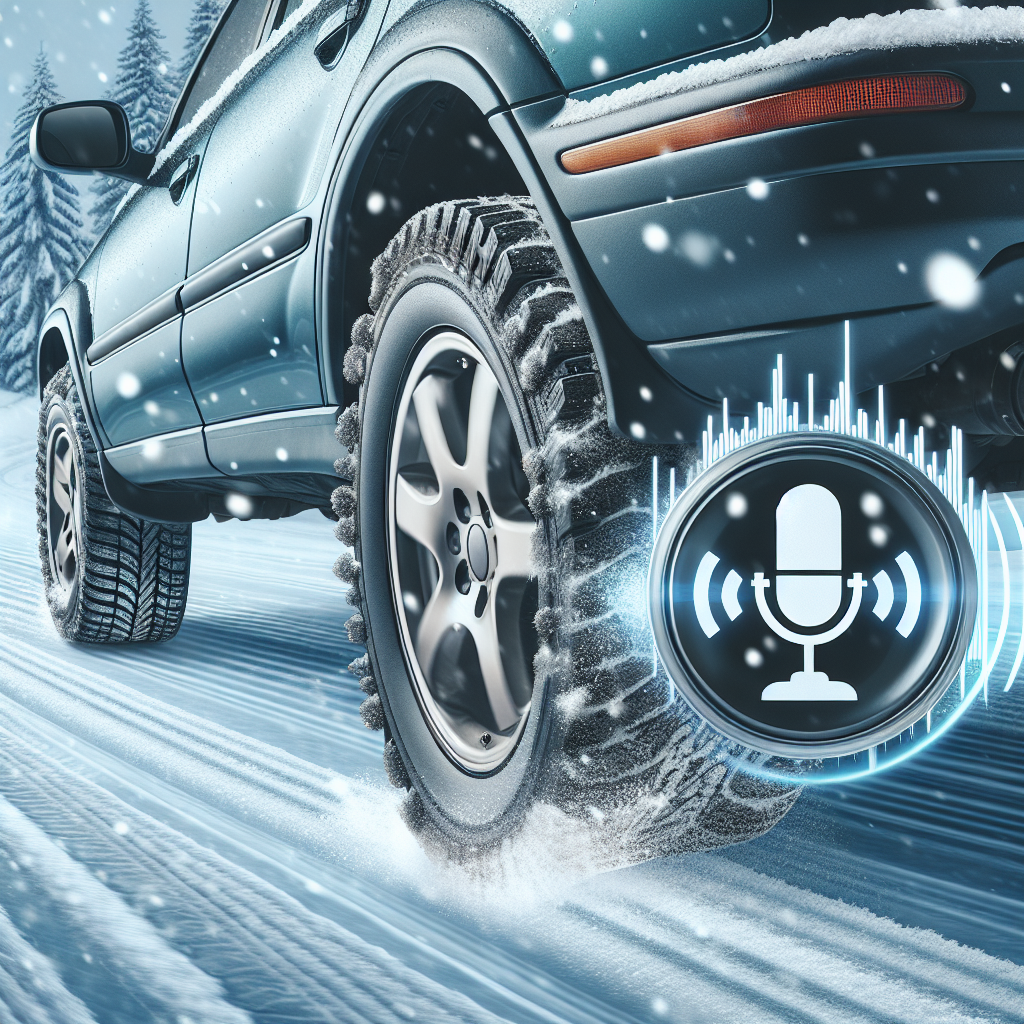In this article, we will explore the fascinating topic of how winter tires can impact the ride comfort and noise levels of your vehicle. With the cold season upon us, many drivers find themselves wondering about the effects of these specialized tires on their driving experience. Whether you’re a winter driving enthusiast or just someone looking to stay safe on the roads during snowy conditions, understanding the impact of winter tires on ride comfort and noise levels is essential. So, let’s dive into this subject and discover what you need to know to make an informed decision for your winter driving needs.

Winter Tires Overview
What are winter tires?
Winter tires, also known as snow tires or cold weather tires, are specially designed tires that are intended for use during winter months or in areas with cold temperatures. These tires are optimized to provide better traction, handling, and braking performance in snowy, icy, and slushy conditions.
Purpose of winter tires
The main purpose of winter tires is to enhance safety and improve the overall performance of vehicles during winter weather conditions. Winter tires are designed with a unique tread pattern and rubber compound that enables them to bite into snow and ice, providing better grip and traction. This helps in reducing the risk of skidding or sliding, allowing for more control and maneuverability on slippery roads. Additionally, winter tires are designed to perform better in low temperatures, ensuring adequate flexibility and grip even in freezing conditions.
Ride Comfort with Winter Tires
Tread Design and Cushioning
The tread design of winter tires plays a significant role in ride comfort. Winter tires typically have deeper and more aggressive tread patterns compared to all-season tires. This allows them to better bite into snow and slush, increasing traction. Moreover, winter tires often feature additional traction-enhancing elements like sipes and biting edges, which further enhance grip on slippery surfaces. The cushioning effect of these treads helps to absorb road imperfections, resulting in a smoother and more comfortable ride.
Impact on Suspension System
The use of winter tires can have a minor impact on the suspension system of a vehicle. The increased tread depth and different tread pattern may slightly affect the vehicle’s ride characteristics. However, modern suspension systems are generally capable of accommodating the slight variations caused by winter tires without significant discomfort or performance degradation.
Vibration Dampening
Winter tires can also help in reducing vibrations. Their tread design, along with the cushioning effect of the tire’s rubber compound, helps in absorbing road vibrations and shocks. This results in a smoother and more comfortable ride, especially on uneven or bumpy surfaces.
Effect on Handling and Cornering
Winter tires are designed to provide better handling and cornering performance on slippery surfaces. The unique tread pattern and rubber compound of winter tires allow them to grip the road better, enabling the driver to have better control when negotiating turns or corners. This improvement in handling can contribute to a more comfortable and confident driving experience in winter conditions.
Noise Levels with Winter Tires
Tire Tread Patterns
The tread pattern of winter tires can significantly impact the noise levels experienced inside the vehicle. Winter tires with aggressive tread patterns often produce more noise compared to all-season tires with a smoother tread pattern. This is because the larger gaps and more prominent tread blocks of winter tires can generate noise as they come into contact with the road surface.
Tire Composition
Winter tires are usually made of a rubber compound that is optimized for cold temperatures. While this rubber compound enhances traction and performance in cold weather conditions, it can also contribute to increased road noise. The softer nature of the rubber compound may generate more noise when in contact with the road.
Road Noise
Road noise refers to the sound generated as the tires interact with the road surface. Winter tires, like any other tire, can produce noise due to factors such as tire rolling resistance, tire interaction with road irregularities, and aerodynamic effects. However, the noise levels generated by winter tires can vary based on the tread pattern, tire composition, and other factors.
Noise Reduction Technologies
To minimize noise levels, some winter tire manufacturers employ noise reduction technologies. These technologies may include the use of noise-absorbing polymers in the tire’s construction, optimized tread patterns for noise reduction, and advanced design techniques to minimize aerodynamic noise. These technologies help to reduce the overall noise levels and provide a quieter and more comfortable ride.
Ride Comfort Comparison: Winter vs. All-season Tires
Differences in Tread Design
The most significant difference between winter and all-season tires lies in their tread design. Winter tires have more aggressive tread patterns with deeper grooves, sipes, and biting edges, specifically designed to enhance traction on snow and ice. In contrast, all-season tires have a more balanced tread design that is suitable for a wide range of weather conditions. The more specialized tread design of winter tires can provide better grip and traction, resulting in improved ride comfort in winter conditions.
Tire Flexibility and Temperature
Another factor that affects ride comfort is tire flexibility. Winter tires are engineered to remain flexible even in very low temperatures, preventing them from becoming rigid and losing traction. This flexibility allows winter tires to conform to the road surface, providing better grip and a smoother ride. All-season tires, on the other hand, may become stiffer in cold temperatures, leading to reduced traction and a potentially harsher ride.
Absorption of Road Imperfections
Winter tires are designed to better absorb and dampen road imperfections, thanks to their unique tread design and the use of softer rubber compounds. This helps in cushioning the vehicle from bumps and irregularities on the road, resulting in a more comfortable ride. All-season tires, although capable of absorbing some road imperfections, may not provide the same level of comfort and smoothness as winter tires in harsh winter conditions.
Overall Suspension Performance
Winter tires can positively impact the overall suspension performance of a vehicle in winter conditions. The enhanced traction and ride comfort provided by winter tires allow the suspension system to work more efficiently, resulting in improved handling, stability, and ride quality. The combination of winter tires and a well-maintained suspension system can further enhance the overall comfort and performance of the vehicle during winter driving.

Noise Levels Comparison: Winter vs. All-season Tires
Tire Tread Blocks and Grooves
The design of tire tread blocks and grooves can significantly influence the noise levels produced by winter and all-season tires. Winter tires often have larger and more widely-spaced tread blocks, which can generate more noise as they come into contact with the road surface. In contrast, all-season tires typically have smaller and more closely spaced tread blocks, resulting in reduced noise levels.
Tire Contact Patch
The contact patch of a tire refers to the portion of the tire that is in contact with the road surface. The size and shape of the contact patch can impact noise levels. Winter tires generally have a larger contact patch due to their aggressive tread patterns, which can result in increased noise when compared to all-season tires with a smaller contact patch.
Sidewall Construction
The construction of a tire’s sidewall can also affect noise levels. Winter tires often have stronger sidewalls to handle harsher winter conditions, resulting in a stiffer overall tire construction. This increased stiffness can contribute to higher noise levels compared to the more flexible sidewalls of all-season tires.
Effect of Road Conditions
Road conditions play a significant role in noise levels experienced while driving. Winter tires, due to their aggressive tread patterns, may produce more noise when driven on dry or cleared roads. On the other hand, all-season tires, with their smoother tread patterns, tend to generate less noise in such conditions. However, in winter conditions where the roads are covered in snow or ice, the noise difference between winter and all-season tires may be less noticeable.
Factors Affecting Ride Comfort and Noise Levels
Tire Pressure
Proper tire pressure is crucial for both ride comfort and noise levels. Underinflated tires can negatively impact ride comfort by reducing grip, increasing rolling resistance, and potentially causing vibrations. Overinflated tires, on the other hand, can result in a harsher ride and increased noise levels due to reduced tire flexibility. Regularly checking and maintaining the recommended tire pressure can help optimize ride comfort and minimize noise.
Tire Size and Aspect Ratio
The size and aspect ratio of the tires can affect ride comfort and noise levels. Tires with larger diameters and lower aspect ratios tend to provide a firmer ride and may generate more noise compared to tires with smaller diameters and higher aspect ratios. It is crucial to choose the right tire size and aspect ratio based on the vehicle’s specifications and desired ride comfort.
Vehicle Weight
Vehicle weight can influence both ride comfort and noise levels. Heavier vehicles may experience a smoother ride due to increased stability, while lighter vehicles may be more susceptible to vibrations and road imperfections. Additionally, vehicle weight can affect noise levels, with heavier vehicles generally producing less cabin noise compared to lighter ones. The choice of tires should consider the vehicle’s weight to optimize ride comfort and noise levels.
Road Surface Conditions
The condition of the road surface can significantly impact ride comfort and noise levels. Smooth and well-maintained roads generally provide a more comfortable ride with lower noise levels. However, rough or uneven road surfaces can result in a harsher ride and increased noise, regardless of the tire type. Road maintenance and repair efforts can contribute to overall ride comfort and noise reduction.

Tips for Improving Ride Comfort and Reducing Noise
Regular Tire Maintenance
To ensure optimal ride comfort and noise levels, regular tire maintenance is essential. This includes checking tire pressure, inspecting for damage or wear, and rotating tires as recommended by the vehicle manufacturer. Proper tire maintenance not only enhances ride comfort but also promotes the longevity and performance of the tires.
Proper Inflation
Maintaining the recommended tire pressure is crucial for ride comfort and noise reduction. It is important to follow the vehicle manufacturer’s guidelines regarding tire pressure. Underinflated or overinflated tires can compromise ride comfort, increase noise levels, and affect overall tire performance.
Choosing the Right Winter Tires
Selecting the appropriate winter tires for your vehicle can make a significant difference in ride comfort and noise levels. Consider factors such as tread pattern, noise-reduction technologies, and overall tire performance. Reading reviews, seeking expert advice, and consulting with tire professionals can help you make an informed decision.
Upgrading Suspension Components
Upgrading suspension components, such as shocks or struts, can also contribute to improved ride comfort and noise reduction. High-quality suspension components are designed to absorb road imperfections more effectively, resulting in a smoother ride. Additionally, performance-oriented suspension upgrades can be tailored to improve ride comfort while maintaining or even enhancing handling characteristics.
Effect of Winter Tire Performance on Vehicle Safety
Braking Performance
Winter tires significantly enhance braking performance in snowy and icy conditions compared to all-season tires. The unique tread design and rubber compound of winter tires allow for better grip on slippery surfaces, reducing stopping distances and improving overall braking performance. This increased braking capability contributes to vehicle safety by helping drivers maintain control and avoid collisions.
Traction and Stability
One of the primary benefits of winter tires is their superior traction on snow, ice, and slush. Winter tires bite into these surfaces, providing better grip and traction, which enhances overall vehicle stability and control. The improved traction and stability offered by winter tires assist drivers in navigating treacherous winter conditions, reducing the risk of accidents and promoting safer driving.
Driver Confidence
Winter tires can significantly enhance driver confidence in winter conditions. The increased traction, improved handling, and enhanced braking performance provided by winter tires instill confidence in drivers, enabling them to feel more in control of their vehicle. When drivers feel confident and secure on the road, they are more likely to make safe driving decisions and respond effectively to unexpected situations.
Winter Tire Regulations
Many regions and countries have regulations concerning the use of specific tires during winter months or under certain weather conditions. These regulations aim to enhance road safety by ensuring that vehicles are equipped with appropriate tires for winter driving. Complying with winter tire regulations not only promotes individual safety but also contributes to overall road safety by reducing the risk of accidents and improving traction on winter roads.

Common Misconceptions about Winter Tires
Winter Tires are Only for Snowy Conditions
It is a common misconception that winter tires are only necessary in regions with heavy snowfall. While winter tires provide excellent traction on snow, they also offer significant benefits in cold temperatures, icy conditions, and even on wet roads. The unique tread pattern and rubber compound of winter tires are designed to perform optimally in these conditions, improving overall safety and performance.
All-season Tires are Sufficient for Winter Driving
Although all-season tires can handle a variety of weather conditions, they are not optimized for extreme winter conditions. All-season tires have compromises in their design to provide acceptable performance in different seasons, making them less effective in harsh winter weather. Winter tires are specifically engineered to excel in low temperatures and provide superior traction on snow and ice, making them a safer and more reliable choice for winter driving.
Winter Tires are Noisier than All-season Tires
While it is true that some winter tires may produce more noise compared to smooth-treaded all-season tires, advancements in tire technology have significantly reduced noise levels. Many winter tire manufacturers use noise reduction technologies and advanced tread designs to minimize noise without sacrificing performance. It is crucial to consider various factors, such as tire brand, model, and technology, when selecting winter tires to ensure a quiet and comfortable driving experience.
Winter Tires are Expensive and Not Worth the Investment
While winter tires may come at a higher initial cost compared to all-season tires, their benefits and long-term value make them a worthwhile investment. The enhanced safety, improved performance, and extended tire life provided by winter tires offset the higher upfront cost. Additionally, by using winter tires during the winter season, all-season tires are preserved, allowing for longer wear and potentially reducing the frequency of tire replacement.
Conclusion
Balancing Comfort and Performance
Winter tires play a crucial role in ensuring a comfortable and safe driving experience during winter conditions. Their specialized tread design, unique rubber compound, and superior performance in low temperatures provide enhanced grip, traction, and ride comfort on snowy, icy, and slushy roads. By investing in winter tires, you can strike a balance between comfort and performance, ensuring a smooth and safe journey throughout the winter season.
Importance of Winter Tires for Safety
Winter tires are essential for maintaining safety on the road during winter weather conditions. They significantly improve braking performance, traction, stability, and driver confidence, reducing the risk of accidents and collisions. Winter tires provide the necessary grip and control to navigate slippery roads, helping you arrive at your destination safely even in challenging winter conditions.
Considerations for Choosing Winter Tires
When selecting winter tires, it is important to consider factors such as tread design, noise levels, traction, handling, and overall tire performance. Reading reviews, consulting with tire professionals, and considering your specific driving needs and the weather conditions in your region can help you choose the right winter tires that not only enhance safety but also provide optimal comfort and performance. Remember, investing in high-quality winter tires is an investment in your safety and peace of mind during the winter season.


